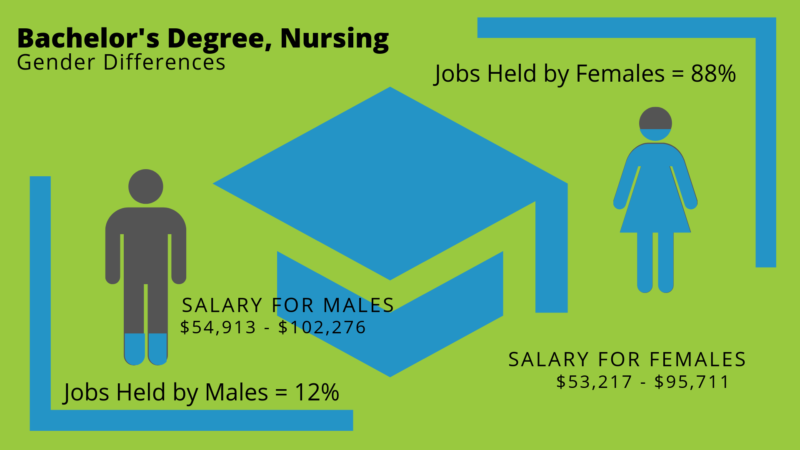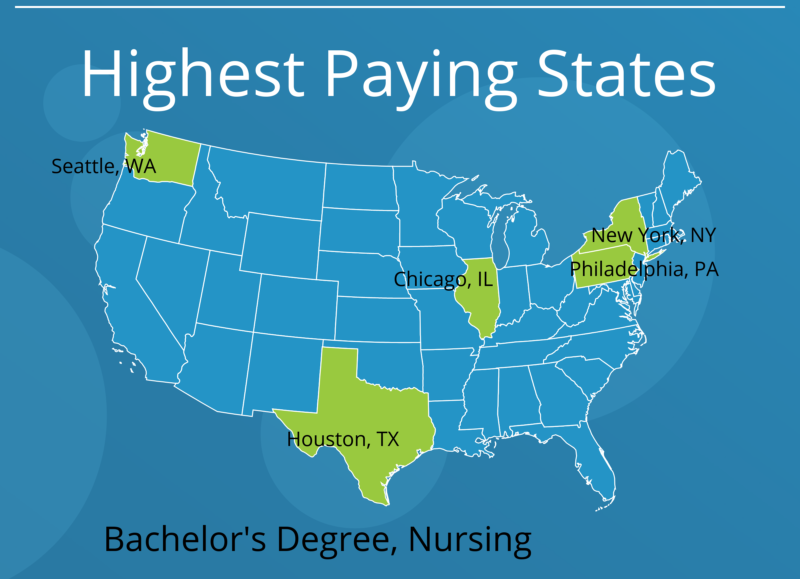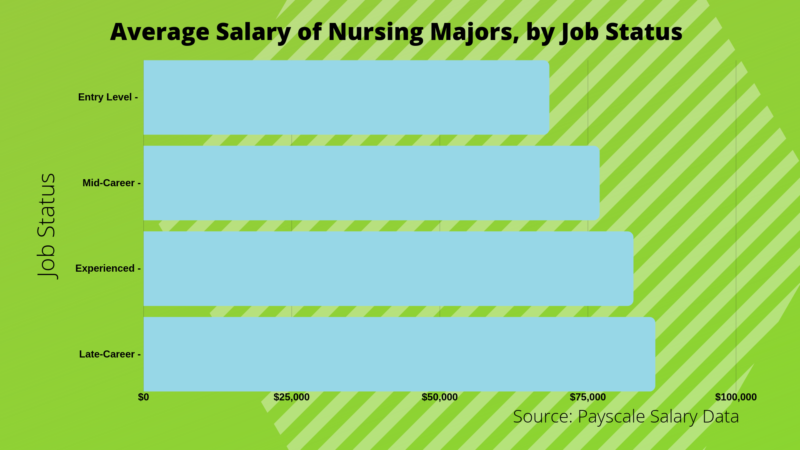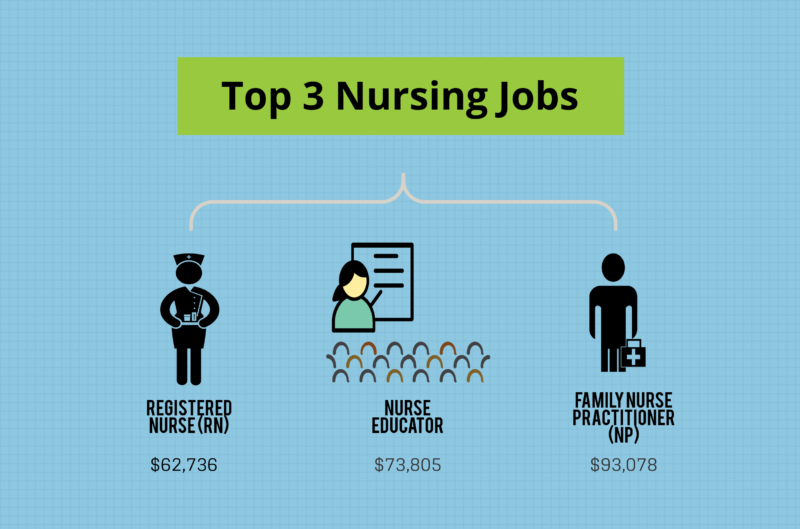Between 2010 and 2030, about 20 percent of the American population will be senior citizens. An aging general population requires skilled healthcare. According to projections by the Bureau of Labour Statistics, there will be a shortage of more than one million registered nurses by 2022. Nursing education programs need to increase the numbers they are graduating with BSN degrees in order to successfully face the problem of an increasingly aging population and a pending nursing shortage.
Here is the reason why a BSN in nursing is important. America’s increasingly aging general population is turning the healthcare system into a more complex environment that requires higher knowledge skill sets. BSN-prepared nurses have in-depth training in the areas of critical thinking and research. They also have the advantage of additional nursing courses. On top of that, there’s sufficient scientific evidence suggesting that a higher percentage of BSN graduates translates to better patient outcomes.
Related:
- Best Online Nursing Degree Programs
- Best Nursing Degree Programs
- Best Online BSN Programs
- Fastest Online Nursing Degree Programs
- Most Affordable Nursing Degree Programs
Is a BSN Worth It?
If you are considering pursuing a BSN degree, there has never been a better time to do it. The country’s desire to improve healthcare delivery and patient outcomes have skyrocketed the demand for BSN-prepared nurses. But is a BSN worth it? Yes, the benefits of having a BSN degree have never been stronger. Employers in the healthcare industry are increasingly opting for BSN-prepared nurses when it comes to recruitment. Here are some of the benefits of having a bachelor’s degree in nursing:
Professional Advancement
BSNs are connected to higher professional development. With a BSN, you have an opportunity to specialize in areas such as psychiatry, oncology, surgery, gynecology, pediatrics, and more. With only an RN diploma, it’s difficult to beyond basic floor patient care.
BSN-Educated Nurses Offer Better Patient Care
According to research collected by the American Association of the Colleges of Nursing (AACN), BSN holders have better patient outcomes including lower failure to rescue rates and lower mortality rates. When it comes to making good diagnoses, BSN holders have higher proficiency.
Improved Clinical Skills
A diploma in nursing only teaches the basics of clinical care. BSN holders get to learn much more including leadership, critical thinking, and communication skills. Additionally, a BSN is recognized as the minimum requirement for professional nursing practice by AACN.
Better Pay
A higher salary is perhaps the biggest motivator when it comes to going back to college. As a BSN holder, you are eligible for higher pay. Data from Payscale.com shows a significant difference between the median salaries BSN holders and people with an RN.
Is a BSN worth it? Definitely. As a nurse, earning a BSN degree is one of the smartest things you can do for your career. In fact, a BSN may be a requirement in the future. In a recently published study, the Institute of Medicine (IOM) recommends increasing BSN holders from the current 50% to 80% by 2020. RNs are encouraged to get a BSN shortly after getting a diploma or an associate degree. The AACN is also going the IOM way by recommending the hiring of BSN holders. That’s why a BSN in nursing is important.

Nursing School Accreditations
What is accreditation? Accreditation is the process of evaluating institutions of higher learning, such as universities and colleges, and their education programs for quality as well as assessing their efforts towards continuous quality improvement. At the most basic level, accreditation is about quality control. Accreditation is conducted by non-governmental associations as a voluntary, self-regulatory process. It is not legally mandated that a college or university seek accreditation.
Accreditation is simply a process of validation. The non-governmental associations that carry out accreditation are known as accrediting bodies or agencies. Accrediting bodies recognize colleges, universities, and educational programs that meet or exceed the standards as well as the criteria for educational quality. The criteria and standards for accreditation are set by faculty members comprising of faculty members from accredited institutions. Accreditation exists at both the national and regional levels.
Why Is Accreditation Important?
When choosing a nursing school, a lot of factors come into play. Cost, proximity to home, work, etc. all play an important role in the final decision. But not many students look at the accreditation when choosing a nursing school. It’s imperative for prospective nursing students to consider accreditation when choosing an entry-level nursing program. Most employers prefer to hire students who have graduated from accredited programs as they are trained under nationally recognized standards for nursing education.
Therefore, selecting an accredited college or university gives you a competitive edge in the job market. Students from accredited nursing school programs are also better qualified to attend other accredited schools and advance their studies. For instance, you’ll have an easier time finding a reputable MSN program with a BSN from an accredited nursing school. Nursing school accreditation also gives the students an opportunity to participate in federally funded and state entitled programs.
Regional Accreditation for Colleges/Universities
There several nursing school accreditations in the US. If you are looking for an online program, there are numerous accredited RN to BSN online programs to consider. For instance, you can choose an online nursing program accredited by the Commission on Collegiate Nursing Education (CCNE), one of the best nursing school accreditations in the nation. There are many CCNE accredited schools if you are wondering if colleges near me with nursing programs that are accredited. The most common nursing school accreditations are:
Commission on Collegiate Nursing Education (CCNE). https://www.aacnnursing.org/CCNE As stated above, CCNE is one of the most common nursing school accreditations in the US. CCNE is an autonomous accreditation agency committed to ensuring quality and integrity in nursing education. CCNE accredited schools are known to have some of the best nursing education programs in the nation. If you are looking for an accredited RN to BSN online programs, consider one of the many CCNE accredited schools online.
National League for Nursing (NLN). http://www.nln.org/ NLN accreditation is awarded by the NLN Commission for Nursing Education Accreditation (CNEA). NLN accreditation is a highly sought-after credential by nursing schools nationally. CNEA uses the National League for Nursing’s core values to promote excellence and integrity in nursing education globally. NLN competencies are can be seen in the high-quality nursing programs offered by schools with NLN accreditation.
Accreditation Commission for Education in Nursing (ACEN). http://www.acenursing.org/ ACEN provides specialized accreditation in all levels of nursing education. ACEN’s goal is to strengthen the quality of nursing education in the United States. It takes time and hard work for nursing schools to meet ACEN standards for accreditation. As a result, ACEN accreditation is one of the most respected in nursing education. As a leading authority in nursing accreditation, ACEN encourages self-regulation.
When running a Google search for ‘colleges near me with nursing programs,’ take some time to look at the nursing school accreditations. Alternatively, you can search for a list of accredited nursing schools near you. Look at CCNE accreditation standards, ACEN standards, and NLN competencies (that’s the crucial 11 core competencies of nursing) to decide what works for you. Is ACEN accreditation good or is CCNE nursing school accreditation better? Do some research about nursing school accreditation; what to look for in different aspects of accreditation.
What Accreditation Should A Nursing Program Have?
The Accreditation Commission for Education in Nursing (ACEN) and Commission on Collegiate Nursing Education (CCNE) are two of the most accrediting bodies in the United States. Both accrediting bodies have high standards in nursing education. CCNE vs ACEN nursing school accreditations have one major difference, the ACEN accredits lower-level LPN, Diploma, or ADN programs while CCNE nursing accreditation only accredits higher-level bachelor’s and graduate program. So, CCNE vs ACEN, what accreditation should a nursing program have?
Both ACEN and the CCNE follow the guidelines stipulated in the 11 core competencies of nursing to promote nursing education. The 11 core competencies of nursing are:
- safe and quality nursing care
- management of resources and environment
- health education
- legal responsibility
- ethic/moral responsibility
- personal and professional development
- quality improvement
- Research
- record management
- Communication
- collaboration and teamwork
ACEN or CCNE, both accrediting bodies recognize only the best nursing education programs.

Types of Nursing Bachelor’s Degrees
Nursing is one of the most rewarding careers in healthcare. One must have a nursing education to become a nurse. Besides accreditation, there are other important factors to consider before joining a nursing school. For instance, what type of nursing degree do you want to pursue? There are different types of nursing degrees to consider. One of the most common options is bachelor’s nursing degrees. Let’s take a closer look at the different types of bachelor’s degree in nursing.
Bachelor of Science in Nursing (BSN)
A Bachelor of Science in Nursing (BSN) degree is the essential standard for a successful nursing career. This type of nursing degree combines classroom learning with hands-on training sessions known as clinicals. Clinicals give students first-hand experience with patients in a clinical setting. The BSN is typically a four-year degree from a college or university. There are many bachelors of science in nursing schools in the US. Look at the accreditation; only the best colleges for nursing in the US have accreditation from organizations such as ACEN or CCNE.
Online Nursing Degrees
You can earn your bachelor’s in nursing online. BSN online nursing programs give students the opportunity to become nurses online. Getting a bachelor’s in nursing online is the most convenient way to become RN. However, students taking bachelor’s in nursing online still have to attend scheduled practical lessons on campus or at a local hospital. Earning a nursing bachelor online is an excellent option, it expands your career options. Nurses with a BSN are eligible for more positions than those with an associate degree or a diploma (just look out for hidden fees).
RN to BSN
RN to BSN programs gives registered nurses who already have an associate’s or diploma an opportunity to earn their BSN. Individuals interested in this program still have to meet bachelor of science in nursing requirements. RN to BSN is one of the most common bachelor of science nursing programs, since most BSN students are returning to school after working as nurses (few nursing students start as freshmen and complete a full 4‑year degree out the gate). Quick online RN to BSN programs take about two years; they provide credits for nursing skills learned through previous education or working experience. These bridge programs are one of the best ways to earn a bachelor’s in nursing online. Search cheap nursing schools near me to find the cheapest online RN to BSN programs.
Licensed Practical Nursing (LPN) Programs
What is the lowest nursing degree? Online LPN nursing programs take about a year to complete. As the lowest nursing degree in rank, it offers many people their entry into the field. They offer the quickest way to become a nurse in the US. Online LPN programs offer a convenient option for working individuals. Most community colleges offer an LPN program. These are fast-paced programs; the students only get to learn the basics. Online LPN nursing programs are available in some of the most affordable nursing schools, so you don’t have to worry about costs. Completing an online LPN nursing program puts you on fast track RN to BSN online programs should you decide to advance your nursing education in the future.
A licensed vocational nurse (LVN) is a similar degree level, usually requiring an associate degree in nursing. At the lower level, you can work as a certified nursing assistant (CNA) with just a high school diploma. A CNA can work in many kinds of care facilities, nursing homes, and other healthcare settings.
Accelerated Nursing Programs
A different type of nursing degrees are accelerated programs. Accelerated nursing programs are the fastest way to earn a bachelor’s nursing degree online. These programs are designed for students who already have a bachelor’s degree in another field but would like to launch a nursing career. If you are one of those individuals, you can take an accelerated 1‑year BSN online program and make your dream of becoming a nurse come true. If cost is an issue, find the cheapest accelerated nursing programs near you and earn bachelor’s in nursing online. Not to worry though, even the cheapest accelerated BSN programs nursing are just as good.
Other Options
If you are not in a position to pursue a BSN at the moment, there are other options that will get you there eventually. For instance, there are free online nursing courses with post-class certifications available. These free online nursing courses with an accompanying certificate are available in some of the best colleges for nursing in the US. There are even free nursing degrees. These options are fast-track RN to BSN online programs often with requirements to serve certain populations or a certain hospital upon completion. Always read the fine print before applying for a free academic program, there may be cheap online RN to BSN programs that will earn you a bachelor’s in nursing online without any further obligations.
BSN online nursing programs can sometimes be reasonably easy to complete. Options such as RN to BSN online with no added clinical component are currently the easiest online RN to BSN programs out there. If you want to be eligible for a bachelor of science in nursing jobs, make sure you have the nursing prerequisites before applying. You may be surprised to find nursing programs near you are also offered online. Those looking for online BSN programs for non-nurses will find accelerated nursing programs quite helpful. As you can see, there are many options when it comes to earning a bachelor’s in nursing online.
What’s the Highest Nursing Degree?
Above the basic bachelor’s degree programs, you find a graduate degree like the master’s degree (MSN degree), the doctor of nursing practice, and the nursing PhD. The highest level of nursing used to be the master’s in nursing, but today DNP programs are becoming far more common and expected for the nursing profession. You need these higher levels for a career path like nurse anesthetist, advanced practice registered nurse (APRN), and nurse administrator.
With a master’s or doctoral degree, you can work in specializations such as a mental health nurse. These higher degrees do require clinical experiences and clinical practice.

Nursing Certifications and RN Licensure: What BSN Nursing Students Need to Know
As a registered nurse, earning nursing certifications shows that you have attained expert knowledge in your respective specialties. Carrying specific nursing certifications has been shown to lead to better patient outcomes and improved patient satisfaction rates. The nursing board certification body, American Nurses Credentialing Center (ANCC) Certification Program issues nursing certifications online. RNs can get nursing certifications online.
There are certifications for nursing students as well as registered nurses. There are nursing certifications for new grads, too. Nursing certifications for new grads allow RNs to get nursing certifications without experience as long as they meet RN certification requirements. Some of the most common nursing certifications include the Family Nurse Practitioner, Certified Paediatric Nurse (CPN), Certified ICU RN, Acute/Critical Care Nursing, and AIDS Certified Registered Nurse.
RN Licensure, Nursing License Renewal, and the Nurse Licensure Compact (NLC)
The Registered Nurse or RN licensure process is similar in all states. There are not many types of nursing licenses; most states recognize the RN. Nursing students have to pass the NCLEX-RN exam to obtain RN licensure. Nursing students take the board exam after they have completed their registered nursing educational requirements. Nursing grads looking for RN licensure are required to apply for the examination and licensure. The student seeking RN licensure is required to send the application to a particular state licensing agency.
What is the Nurse Licensure Compact? The Nurse Licensure Compact (NLC) is an agreement that enables mutual recognition of RN licenses among member states in the US. RNs from Nurse Licensure Compact (NLC) member states can practice in other NLC member states without having to obtain additional licenses. NLC improves public access to healthcare and maintains public protection at the state level.
Remember that your nursing license expires on your birthday in even-numbered years. Online nursing license renewal allows you to renew your license even before it expires. You cannot practice with an expired license. You can begin practicing as soon as the nursing license renewal process is complete, processed, and your license is available for verification. You can renew your nursing license 90 days before expiration.

What Can You Do with a Bachelor’s in Nursing?: Types of Nurses and Salaries
Have you wondered, “What can I do with a bachelor’s in nursing?”Nursing careers are in demand and job projections are quite strong. One of the benefits of a nursing career is the high income, relative to the amount of education; nursing is one of the highest-paying bachelor’s degree careers. There are many types of nurses and salaries vary from one specialty to the next. When it comes to nursing careers salary, the median annual wage is $68,450. There are many types of nursing career options to consider. If you are confused about types of nursing careers, here’s a list of nursing fields or nursing specialties in demand.
- Clinical Nurse Specialist. Clinical nurse specialists diagnose and treat various in a specialized unit or clinic.
- Family Nurse Practitioner. This type of nurse functions like a primary care physician performing roles such as consultation, assessment, treatment, and prescribing medication.
- Informatics Nurse. Informatic nurses use communication technologies and information management techniques to promote public health.
- Nursing Administrator. The work environment of a nurse administrator involves dealing with HR, staff management, budgeting, and other backstage operations in nursing.
- Pain Management Nurse. This type of nurse works with patients with chronic pain issues or help patients manage pain after surgery.
- Psychiatric Nurse Practitioner. This work environment of a nurse involves working patients with mental disorders under a psychiatric physician.
Other nursing specialties in demand include General Nurse Practitioner, Gerontological Nurse Practitioner, Certified Nurse Midwife, Health Policy Nurse, Neonatal Nurse, and Nurse Educator; in most cases, however, these specializations require a Master of Science in Nursing (MSN). These are some of the best nursing careers at the moment. Use this nurse careers list with different types of nurses and descriptions to understand the different types of nurse specialties. When looking for nursing careers near me, consider this nursing careers list as a guide to types of nursing jobs and salaries.
Bachelor’s Degree in Nursing Salary
Nursing is one of the most promising careers at the moment. How much does a nurse make with a bachelor’s degree? How much do nurses make an hour starting out? The bachelor’s in nursing salary varies based on factors such as experience, location, and other factors. The median national annual salary for newly registered nurses is $68,450 according to U.S. Bureau of Labor Statistics’ current Occupational Outlook Handbook. That translates to $34.23 per hour for those wondering how much do nurses make an hour starting out. How much does a nurse make a month?
Like the hourly wage, the monthly bachelor’s in nursing salary varies depending on location and experience. The highest bachelor of science in nursing salary is around $102,990 per year while the lowest is $47,120 according to recent BLS reports. That translates to $8512 and $3926 for the highest and lowest paid RN for those wondering how much does a nurse make a month. When it comes to RN vs BSN salary and ADN vs BSN salary, there’s a significant difference. Nurses with a BSN degree earn more than their associate degree and diploma associates.
Professional Nursing Organizations: Purpose and Benefits
Nursing organizations play an important role in professional development. Professional nursing organizations’ purpose is to provide members with role-related competencies, certification opportunities, continuing education, and to be the voice of the member nurses. Nursing organizations have a lot of benefits for members. Most nursing organizations offer free nursing association memberships. Here are the top 10 nursing organizations in the US:
• Nursing Organizations Alliance (NOA)
• Emergency Nurses Association (ENA)
• National Student Nurses Association (NSNA)
• American Psychiatric Nurses Association (APNA)
• Academy of Neonatal Nursing (ANN)
• American Association of Nurse Anaesthetists (AANA)
• Academy of Medical-Surgical Nurses (AMSN)
• National Association of Orthopaedic Nurses (NAON)
• Professional Association of Nurse Travelers (PanTravelers)
These are the top 10 nursing organizations in the country. As stated earlier, professional nursing organizations’ purpose is mainly to provide professional development and form a united voice. There are many types of nursing organizations in the US including nursing organizations for students, the National Student Nurses Association (NSNA), for instance, pediatric nursing organizations, international nursing organizations, and more.
